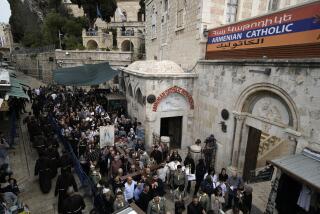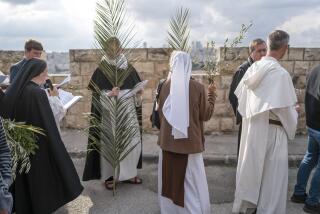Bethlehem’s Holy Sites Retain Much Power
- Share via
BETHLEHEM — In the 2,000 years since Mary gave birth here to a child called Jesus, everything has changed in this little town--and nothing has changed at all.
As Israeli forces withdrew from the city recently, they left a sprawling Palestinian center of 40,000 people. Christians are no longer the majority in the place of Jesus’ birth.
And the once-picturesque enclave of stone homes nestled among vineyards in the Judean hills has been transformed into a concrete sprawl, choked by heavy trucks supplying construction materials to Israel’s booming economy.
Yet as Bethlehem continues to change political hands, the magnetism of its holy sites to believers the world over is as powerful as ever.
“My hope this Christmas would be that finally people will . . . stop bickering on the nasty problems of human borders, that we might extend hands together and celebrate,” says Vatican envoy Monsignor Richard Mathes.
Since the first reference to Bethlehem appeared in ancient manuscripts centuries before the birth of Jesus, the town has seen dozens of temporal leaders come and go.
For centuries, the town was a market center on the fringes of the Judean desert, a link between the metropolis of Jerusalem and a stark wilderness inhabited only by nomads.
At the time of Jesus’ birth, the Romans were the masters of the land, and Jews were among its poor and downtrodden. A hundred years later, most of Bethlehem’s Jews were killed or expelled from the town by conquering Roman forces.
But with the upsurge of Christianity in the waning days of the Roman empire, the city gained fame as the birthplace of Jesus, and by the 5th century, dozens of monasteries had been built to house the area’s 20,000 monks.
Throughout subsequent centuries of Muslim conquest, Christian crusades and counter-Arab thrusts, Christians managed to maintain a continuous presence in Bethlehem. But an influx of Muslim refugees into the area after the 1948 Israeli-Arab war left Christians in the minority.
Of the 100,000 Palestinians living in the Bethlehem district today, only about 22,000 are Christian; the remainder are Muslim. The number of Christians has declined slowly as the relatively wealthy and westernized Palestinian Christian population emigrates steadily to the West.
More to Read
Sign up for Essential California
The most important California stories and recommendations in your inbox every morning.
You may occasionally receive promotional content from the Los Angeles Times.













